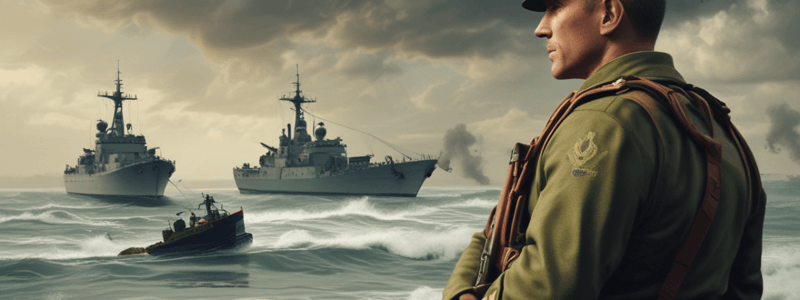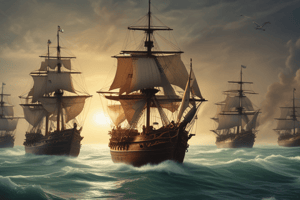Podcast
Questions and Answers
When were the Royal Marines officially renamed?
When were the Royal Marines officially renamed?
- 1775
- 1942
- 1664
- 1802 (correct)
Which conflict did the Royal Marines FIRST participate in after their founding?
Which conflict did the Royal Marines FIRST participate in after their founding?
- Napoleonic Wars
- American Revolutionary War
- Second Anglo-Dutch War (correct)
- Crimean War
What significant operation did the Royal Marines participate in during World War I?
What significant operation did the Royal Marines participate in during World War I?
- Landings in Gallipoli (correct)
- Battle of Verdun
- D-Day landings
- Battle of the Somme
Which specialized units were formed by the Royal Marines during World War II?
Which specialized units were formed by the Royal Marines during World War II?
Which campaign is associated with the Royal Marines' involvement in the 19th century?
Which campaign is associated with the Royal Marines' involvement in the 19th century?
What type of missions do the Royal Marines engage in during the modern era?
What type of missions do the Royal Marines engage in during the modern era?
What is the name of the brigade known for its elite status within the Royal Marines?
What is the name of the brigade known for its elite status within the Royal Marines?
What was one of the significant roles of the Royal Marines during the Gulf War?
What was one of the significant roles of the Royal Marines during the Gulf War?
What does the training process for the Royal Marines emphasize?
What does the training process for the Royal Marines emphasize?
Which century saw the expansion of the Royal Marines through the establishment of several battalions?
Which century saw the expansion of the Royal Marines through the establishment of several battalions?
Flashcards are hidden until you start studying
Study Notes
Early History
- Founded: The Royal Marines were established in 1664 as the Duke of York and Albany's Maritime Regiment of Foot.
- Role: Originally intended for shipboard service, providing a professional body of soldiers to enhance naval operations.
- First Engagement: Participated in the Second Anglo-Dutch War (1665–1667).
18th Century Developments
- Formalization: In 1802, they were officially renamed the Royal Marines.
- Notable Campaigns: Involved in various conflicts, including the Napoleonic Wars (1803–1815) and the American Revolutionary War (1775–1783).
- Growth: Expanded during the 19th century, establishing several battalions.
19th Century Evolution
- Crimean War: Played a significant role in key battles such as the Siege of Sevastopol (1854-1855).
- Imperial Service: Engaged in colonial conflicts, often deployed for quick-response operations in distant territories.
20th Century Milestones
- World War I: Involved in significant amphibious operations, including landings in Gallipoli (1915).
- World War II: Expanded significantly; notable operations included D-Day landings (1944) and campaigns in the Pacific.
- Commando Units: Formation of specialized Commando units in 1942, focusing on raiding and unconventional warfare.
Modern Era
- Post-War Role: Continued to adapt to changing military needs, including peacekeeping and humanitarian missions.
- Gulf War: Participated in the 1990-1991 Gulf War, showcasing versatility in modern warfare.
- Recent Conflicts: Involved in operations in Iraq and Afghanistan, emphasizing counter-terrorism and stabilization.
Structure and Training
- Organization: Comprises several units, including 3 Commando Brigade, known for its elite status.
- Training: Rigorous selection and training process, including the Commando Course, which emphasizes physical fitness and combat skills.
Cultural Significance
- Symbolism: The green beret is a symbol of elite status and rigour.
- Legacy and Traditions: Rich traditions in music, ceremonial duties, and community engagement.
Conclusion
- The Royal Marines have a storied history marked by adaptability and resilience, playing a crucial role in British military operations across centuries.
Early History
- Established in 1664 as the Duke of York and Albany's Maritime Regiment of Foot.
- Originally designed for shipboard service to bolster naval operations.
- First saw action during the Second Anglo-Dutch War (1665–1667).
18th Century Developments
- Officially renamed the Royal Marines in 1802.
- Actively participated in the Napoleonic Wars (1803–1815) and the American Revolutionary War (1775–1783).
- Expanded significantly throughout the 19th century, creating multiple battalions.
19th Century Evolution
- Significant involvement in the Crimean War, particularly at the Siege of Sevastopol (1854-1855).
- Engaged in numerous colonial conflicts, renowned for quick-response deployments in far-off territories.
20th Century Milestones
- Contributed to crucial amphibious operations during World War I, notably the Gallipoli landings in 1915.
- Expanded considerably during World War II, with key operations like D-Day landings (1944) and missions in the Pacific.
- Specialized Commando units were formed in 1942, focusing on unconventional warfare and raiding tactics.
Modern Era
- Post-World War adaptations included involvement in peacekeeping and humanitarian efforts.
- Played a role in the Gulf War (1990-1991), demonstrating flexibility in modern military operations.
- Recent engagements in Iraq and Afghanistan emphasized counter-terrorism and stabilization efforts.
Structure and Training
- Organized into several units, with 3 Commando Brigade recognized for its elite status.
- Rigorous training regimen, including the challenging Commando Course, prioritizing physical fitness and combat readiness.
Cultural Significance
- The green beret serves as a powerful symbol of elite status and the Royal Marines' rigorous training.
- Rich traditions encompass music, ceremonial roles, and community service, fostering a strong legacy.
Conclusion
- The Royal Marines have a long and adaptive history, consistently playing a vital role in British military endeavors across different periods.
Studying That Suits You
Use AI to generate personalized quizzes and flashcards to suit your learning preferences.




